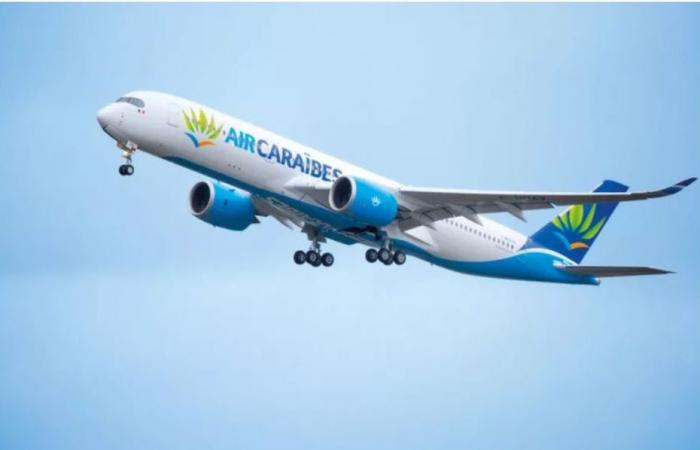
With the reception this Monday, December 16, 2024 in Toulouse of a new long-haul aircraft, the airline group is renewing its confidence in Airbus. Air Caraibes management has announced that it will use this new Airbus A-350 aircraft to increase rotations between Paris and the Antilles and Guyana during peak periods.
With 14 aircraft, including 10 long-haul aircraft, Dubreuil aéro, owner of the airlines Air Caraibes and French Bee, is now the leading French private airline group. Passionate about aviation, Jean-Paul Dubreuil, its founder, bought Air Caraibes – a West Indian company – in 1998 and then launched the first transatlantic connection on December 12, 2003. With the help of Marc Rochet, a French air transport leader, they went to compete with Air France and Corsair on the busiest airline routes in France: first the Antilles and Reunion, routes where more than a million passengers pass through year, then Guyana and finally Polynesia in May 2018 with French Bee, the little low-cost sister of Air Caraibes founded in 2016.
To support their growth, Jean-Paul Dubreuil and Marc Rocher chose to invest in a fleet of new aircraft. At the time, they opted for Airbus rather than Boeing, even though the American manufacturer dominated the airliner sales market.
Air Caraibes and French Bee have become two strategic long-haul airlines for French overseas territories. Beyond territorial continuity, they have brought competition to destinations and allowed passengers better services, more frequencies and lower prices of plane tickets. Decreases even in these times of economic crisis, even in this period of rising prices, due to the explosion in fuel prices, inflation, the lack of parts for aircraft maintenance, tax increases… For many air transport experts, the presence of these two companies slows the rise in prices flights to and from overseas.
The delivery of this last new aircraft was also an opportunity for the Dubreuil aéro group to ensure the transition of governance between the two Dubreuils: father Jean-Paul, the one who introduced aviation into the group’s activity and his son, Paul-Henri, who now presides over the destiny of the entire Dubreuil empire where air transport represents 34% of turnover.
After receiving the A-350-1000 registered F-HAJP, the Dubreuil group should undoubtedly take a break from the growth of its aircraft fleet to focus only on the effective filling of its aircraft, in a particularly economic sector. fragile. Commercial air transport has been hit by the Covid crisis and finds itself facing very impactful environmental constraints, structurally and economically.
*”With new planes that consume around 25% less fuel, 50% less noise than old Airbus and Boeing models and less CO2 polluting, we are confident about the future of our airline group”confided Paul-Henri Dubreuil at the ceremony of handing over the keys to the plane at Airbus. “From now on, we must consolidate our services and fill our planes to the maximum to reimburse the purchase of these technological jewels and develop ourselves”he insisted.
•
©Jean-Michel Mazerolle
Recent history has demonstrated how fragile the French air transport economy is, even more so for small companies which ensure territorial continuity in the face of international behemoths which have neither the same economic models nor the same problems and constraints of services. All of them, with the exception of Air France and the two companies Air Caraibes and French Bee, rely on the financial support of the overseas territories to which they are linked: Air austral with Réunion, Aircalin with New Caledonia, Air Tahiti nui with Polynesia French and even Corsair, although a private company very dependent on West Indian investors. Economic realities that Europe monitors very closely and regularly tackles on the grounds that these territorial aids are “aid distorting competition”.
Behind the delivery of aircraft for Air Caraibes, the whole issue of territorial continuity and its consequences for overseas populations is at stake. If most of these specialized companies disappear, how will this territorial continuity be she insured? At what price and at what frequencies? To be continued.





